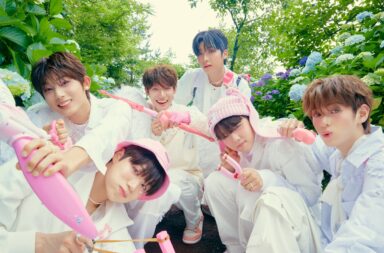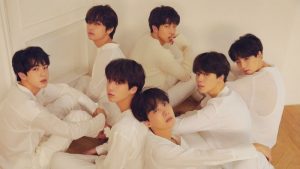 “With great powers comes great responsibility” is probably Spider-Man’s most famous quote, and it applies perfectly to BTS’ current position in the K-pop scene. On May 20th, BTS performed “Fake Love” from their latest album Love Yourself: Tear for the first time at the Billboard Music Awards, introducing their new song to an audience completely unfamiliar with them and their music. Regardless of all of this, responses have been overwhelmingly positive.
“With great powers comes great responsibility” is probably Spider-Man’s most famous quote, and it applies perfectly to BTS’ current position in the K-pop scene. On May 20th, BTS performed “Fake Love” from their latest album Love Yourself: Tear for the first time at the Billboard Music Awards, introducing their new song to an audience completely unfamiliar with them and their music. Regardless of all of this, responses have been overwhelmingly positive.
BTS never let a single completely genre define them. They’ve always pushed their artistry further and further through new sounds. Since rap is a prominent part in most of their songs in general, they can be called hip-hop artists, but they haven’t been afraid to venture into mellow ballads, EDM, Moombahton and so on. In this sense, Love Yourself: Tear is the perfect example of their will to explore a wider range of genres.
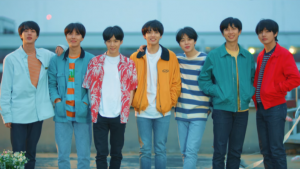
Once again BTS surrounded themselves with a roster of in-demand producers from all over the world. “Intro: Singularity” is the fruit of a collaboration between by British producer and songwriter Charlie J. Perry and member RM. The collaboration with American DJ and producer Steve Aoki continues in the song “The Truth Untold” sung by the vocalists Jin, Jimin, V and Jungkook. “The Truth Untold” is a piano ballad about the sense of inadequacy and regret felt after breaking up. The Grammy Award-winning producer DJ Swivel (who worked with The Chainsmokers, Jay-Z, and Beyoncé, among others) is one of the authors of the EDM upbeat song “Magic Shop”, alongside member Jungkook. “Magic Shop” is probably the brightest songs on the album and sees an alternation of rap, delicate falsettos in the chorus. It’s a hymn to self-love and it is speculated to be a gift from BTS to their fans, Army.
Love Yourself: Tear starts with gloomier songs with a slower tempo, only to explode with brighter tunes on its second part. The album kicks off with classic R&B track with “Intro: Singularity”, which serves as a showcase for vocalist V’s warm and soulful voice. The vocals are the song’s highlight and the instrumental is kept as minimalistic as possible, with frequent silent pauses. Rather than showing off his vocal range and high-notes, V plays a lot with intensity in singing about the distress losing his lover is causing him.
One of the most emotional songs on the album is its lead single “Fake Love”, an interesting mix of rock with rap. Jimin and Jin’s belted choruses are the climax of the song and deserve to be praised. The album’s intensity starts growing with “Magic Shop” and explodes in “So What”. The group’s three rappers RM, Suga and J-Hope are then in charge of wrapping up with “Outro: Tear”. In this song, Suga seems to have caught up with the current hip-hop trends: while he always keeps it real to his own style, his flow in the second part of his verse is contaminated by influences from the Atlanta hip-hop scene (for example: Gucci Mane, Migos, and 21 Savage).
As said before, the album is very diverse. Seeing BTS being so eclectic serves as a proof of their growth, both as individuals and as maturing artists. Being active figures in creating their own songs and surrounding themselves with a roster of both Korean and Western producers, they get to give their music a sound on par with the latest trends (like the fun Latin Pop inspired “Airplane Pt.2”) and at the same time stay very faithful to their K-pop roots.
What really brings the album together is the lyrics. In the Love Yourself series, BTS explores the theme of love. The series’ first part (Love Yourself: Her) was about boys experiencing falling in love for the first time. In Love Yourself: Tear, BTS talk about the sense of loss and pain that follows a break-up. At the beginning of the album, BTS often blame themselves, and what they lack for the failure of the relationship. Sometimes this turns into self-loathing, as seen in “The Truth Untold”:
I have to hide
Because I am ugly
I’m afraid
I’m pathetic
I’m so afraid
In case you too leave me in the end
Once again I put on a mask and go to meet you
After the initial distress, they come to the realisation that the only way to ease this kind of pain is actually self-love. It’s often said that in order to be in a fulfilling and healthy relationship, it is fundamental to be, first and foremost, content with oneself. BTS acknowledge that there might be dark times, but these can be overcome. The second part of the album, starting from “Paradise”, overflows with positivity and sends an encouraging message, such as these lyrics from “Magic Shop”:
On days where I hate myself for being me
On days where I want to disappear forever
Let’s make a door, inside your heart
If you open the door and go in, this place will await you
It’s alright to believe in it, it’ll comfort you, Magic Shop
BTS’ lyrics, especially the rap parts, have always been complex and full of smart references. For example a lot can be said about “134340”, a reference to when Pluto was demoted from planet to dwarf planet, which is used to show how lovers turn into strangers. This groovy R&B song is filled with various other references to astronomy: one example is RM’s line “Did you really find Eris?” — Eris is the second biggest dwarf planet after Pluto. The song is sung from the point of view of someone who identifies with Pluto (“Once I was in a world under the sun, only stale fog in this star’s heart”), then Eris would be his substitute in the lover’s heart.
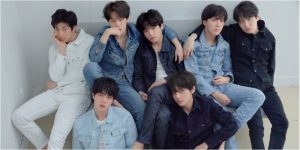
BTS lyrics help them stand out in various ways. On one hand, we have the Western market, where sometimes hip-hop gets unfairly and unjustly frowned upon and stereotyped because of the usage of vulgar lyrics in some widely popular songs. Those who detach themselves from stereotyped themes (such as drugs, women, and riches) and manage to break the bias are generally well received — an example of excellence is Kendrick Lamar winning the Pulitzer Prize with his album Damn. BTS fall into this category, with their lyrics mostly talking about emotions and feelings they have experienced first-hand, easily relatable for many young adults their age. On the other hand, in K-pop not every group gets to pen their lyrics themselves, often at the expense of their perceived authenticity. Writing one’s own lyrics helps the artists conveying the exact message they want to transmit.
Fans all over the world have been able to empathize with BTS’ lyrics and were often soothed and comforted by the positivity their lyrics often want to transmit. Living in an era where fast internet is accessible virtually everywhere and contents can spread within seconds, there is almost no such thing as a language barrier anymore. Fans all over the world have been able to access translations of BTS’ lyrics and often declared that those have been a source of strength. The American music market isn’t open to music in languages different than English, with Spanish being the only rare exception. The fact that a group that sings only in Korean has been acknowledged by such a closed market is extremely important and shows how powerful the band really is. BTS and their fans have done the unthinkable bringing mainstream attention to music sung in a language spoken in a single small country.
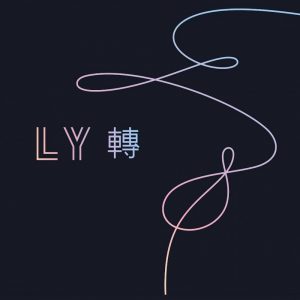 BTS is essentially an unprecedented story of how far a group considered an underdog can go. Coming from a small agency, their odds of shooting to stardom were pretty slim to begin with. The secret of their success lies in a series of factors. First of all, starting from early on in their careers, they have been working first-hand on their music, keeping an eye on trends from Western markets, but always being faithful to their Korean roots. This unique sound allowed them to be appealing to a wider audience. Then, they have been constantly communicating with their fans, uploading new content almost daily through every mean (social media, YouTube, V-app): this has led people into joining their fandom and discovering K-pop. With such frequent communication from the artist, fans have been able to feel closer to BTS and feel like they contributed actively in BTS’ rise with their support. Throughout the years, BTS has never been afraid of showing their growth from teenagers to young adults and subsequently more mature artists. With its polished sound and a board spectrum of sonorities, Love Yourself: Tear is by far BTS’ most mature release to date.
BTS is essentially an unprecedented story of how far a group considered an underdog can go. Coming from a small agency, their odds of shooting to stardom were pretty slim to begin with. The secret of their success lies in a series of factors. First of all, starting from early on in their careers, they have been working first-hand on their music, keeping an eye on trends from Western markets, but always being faithful to their Korean roots. This unique sound allowed them to be appealing to a wider audience. Then, they have been constantly communicating with their fans, uploading new content almost daily through every mean (social media, YouTube, V-app): this has led people into joining their fandom and discovering K-pop. With such frequent communication from the artist, fans have been able to feel closer to BTS and feel like they contributed actively in BTS’ rise with their support. Throughout the years, BTS has never been afraid of showing their growth from teenagers to young adults and subsequently more mature artists. With its polished sound and a board spectrum of sonorities, Love Yourself: Tear is by far BTS’ most mature release to date.
Mixing a variety of genres without ever being dull, Love Yourself: Tear shows how eclectic BTS have become. They developed a unique touch they give to their music, no matter if produced with the people they’ve always worked with (such as Pdogg and Bang Si-hyuk) or with international powerhouses. This combined with their honest and meaningful lyrics make Love Yourself: Tear an album worth checking out even by non-fans. Being the potential first exposure to K-pop of an unfamiliar and potentially uninterested audience is definitely a huge responsibility, but Love Yourself: Tear is a release solid enough to make an impact regardless.
(YouTube, Bangtan Subs, Images via Big Hit Entertainment)


